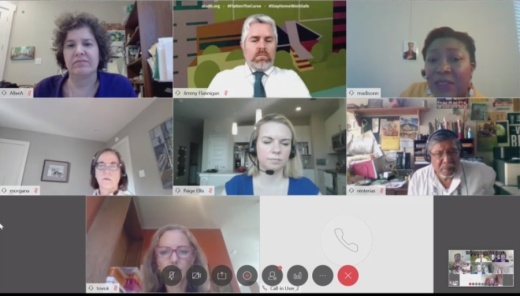The March 26 meeting was the first for City Council since strict social distancing measures went into effect to combat the spread of the highly contagious coronavirus, a global pandemic that has placed much of the world, including Austin, on hold.
Austin Mayor Steve Adler, Mayor Pro Tem Delia Garza and three other council members sat in City Hall’s council chambers, while the other six council members and City Attorney Anne Morgan called in by video.
The meeting focused on three relief items aimed at helping renters, workers and small businesses who have seen wages and financial stability deteriorate as the virus has taken hold of the local economy and community life.
Renter assistance
With a unanimous vote, Austin City Council passed a new law, led by District 4 Council Member Greg Casar, requiring landlords to give renters a 60-day “grace period” to pay due rent before eviction proceedings can begin.
Earlier in the month, municipal court officials suspended all eviction hearings until May 8 in response to the growing financial hardship experienced by residents from the coronavirus. However, even with eviction hearings suspended, landlords could still begin eviction proceedings against a tenant, such as issuing a “notice to vacate.”
Under the new law passed March 26 by City Council, landlords must first issue a proposal for eviction. After the proposal notice is issued to a tenant, the tenant has, by law, 60 days to pay rent before the landlord can move forward with any eviction proceeding. The law is effective through the 61st day after May 9.
“No one should lose their home during a pandemic,” Casar said. “It’s wrong and it’s bad for public health.”
Tenants calling in to speak on the item said they appreciated the move by City Council but said it was not enough. Several tenants said they would not be able to handle rent debt and that the city or other forms of government needed to begin considering rent relief.
Adam Gates, a local landlord, objected to the new law and said the city could not ask landlords to absorb a rent subsidy. Such a subsidy, he said, should be shouldered by the city, state or federal government.
Casar said this law could not and should not be the only assistance coming for renters. He said the economic harm caused by the virus requires massive relief from the government and that this law will buy City Council and state and federal government time to craft those packages.
Sweeping direction the help small business, workers
What began as a resolution to help small businesses and laborers who experienced significant economic loss from the March 6 cancellation of South by Southwest—the most lucrative 10 days of the year for many businesses and workers—evolved in recent weeks. City Council ultimately passed a wide-ranging direction for city staff to begin drafting assistance programs for those across the local economy who have been hurt by the virus and subsequent mitigation measures.
The resolution, led by District 6 Council Member Jimmy Flannigan but crafted by most of the dais, does not in itself create any programs. Rather, it gives city staff ranging authority to begin developing economic relief programs through a variety of means.
Staff will begin contemplating local loan programs for workers and small businesses as well as discussing how to bring relief to caretakers and provide child care for essential employees whose children are not going to school because of the virus. City staff has the ability to rethink how the city spends tens of millions of dollars in hotel tax revenue and potentially suspend corporate tax breaks worth millions.
Flannigan said the resolution was purposely drafted with broad language to give city staff the flexibility they needed.
“We are 100% committed to our folks in Austin,” Flannigan said. “We are all suffering through this together, and we are going to get through it together.”
City Council also unanimously approved the Economic Injury Disaster Loan Program, which will offer $35,000 in gap financing loans to small businesses impacted by the coronavirus and applying for economic disaster loans through the federal Small Business Administration. The local program is meant to get money to local small businesses right away as they wait for money from the SBA. Local assistance will come from a $4.5 million fund the city has through the U.S. Housing and Urban Development Department.





